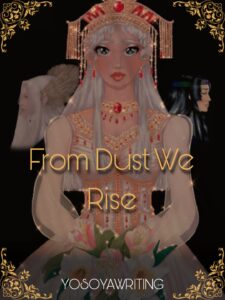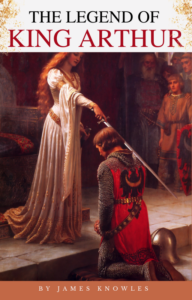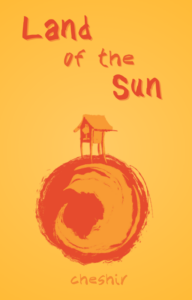“The pair of wings a fiction are,
The arrows, they are naught but claws,
The wreath conceals the little horns,
For without any doubt he is
Like all the gods of ancient Greece
Only a devil in disguise.”
Then I put the picture before me on my table, supporting it with a book, and looked at it.
I was enraptured and at the same time filled with a strange fear by the cold coquetry with which this magnificent woman draped her charms in her furs of dark sable; by the severity and hardness which lay in this cold marble-like face. Again I took my pen in hand, and wrote the following words:
“To love, to be loved, what happiness! And yet how the glamour of this pales in comparison with the tormenting bliss of worshipping a woman who makes a plaything out of us, of being the slave of a beautiful tyrant who treads us pitilessly underfoot. Even Samson, the hero, the giant, again put himself into the hands of Delilah, even after she had betrayed him, and again she betrayed him, and the Philistines bound him and put out his eyes which until the very end he kept fixed, drunken with rage and love, upon the beautiful betrayer.”
I was breakfasting in my honey-suckle arbor, and reading in the Book of Judith. I envied the hero Holofernes because of the regal woman who cut off his head with a sword, and because of his beautiful sanguinary end.
“The almighty Lord hath struck him, and hath delivered him into the hands of a woman.”
This sentence strangely impressed me.
How ungallant these Jews are, I thought. And their God might choose more becoming expressions when he speaks of the fair sex.
“The almighty Lord hath struck him, and hath delivered him into the hands of a woman,” I repeated to myself. What shall I do, so that He may punish me?
Heaven preserve us! Here comes the housekeeper, who has again diminished somewhat in size overnight. And up there among the green twinings and garlandings the white gown gleams again. Is it Venus, or the widow?
This time it happens to be the widow, for Madame Tartakovska makes a courtesy, and asks me in her name for something to read. I run to my room, and gather together a couple of volumes.
Later I remember that my picture of Venus is in one of them, and now it and my effusions are in the hands of the white woman up there together. What will she say?
I hear her laugh.
Is she laughing at me?
It is full moon. It is already peering over the tops of the low hemlocks that fringe the park. A silvery exhalation fills the terrace, the groups of trees, all the landscape, as far as the eye can reach; in the distance it gradually fades away, like trembling waters.
I cannot resist. I feel a strange urge and call within me. I put on my clothes again and go out into the garden.
Some power draws me toward the meadow, toward her, who is my divinity and my beloved.
The night is cool. I feel a slight chill. The atmosphere is heavy with the odor of flowers and of the forest. It intoxicates.
What solemnity! What music round about! A nightingale sobs. The stars quiver very faintly in the pale-blue glamour. The meadow seems smooth, like a mirror, like a covering of ice on a pond.
The statue of Venus stands out august and luminous.
But—what has happened? From the marble shoulders of the goddess a large dark fur flows down to her heels. I stand dumbfounded and stare at her in amazement; again an indescribable fear seizes hold of me and I take flight.
I hasten my steps, and notice that I have missed the main path. As I am about to turn aside into one of the green walks I see Venus sitting before me on a stone bench, not the beautiful woman of marble, but the goddess of love herself with warm blood and throbbing pulses. She has actually come to life for me, like the statue that began to breathe for her creator. Indeed, the miracle is only half completed. Her white hair seems still to be of stone, and her white gown shimmers like moonlight, or is it satin? From her shoulders the dark fur flows. But her lips are already reddening and her cheeks begin to take color. Two diabolical green rays out of her eyes fall upon me, and now she laughs.
Her laughter is very mysterious, very—I don’t know. It cannot be described, it takes my breath away. I flee further, and after every few steps I have to pause to take breath. The mocking laughter pursues me through the dark leafy paths, across light open spaces, through the thicket where only single moonbeams can pierce. I can no longer find my way, I wander about utterly confused, with cold drops of perspiration on the forehead.
Finally I stand still, and engage in a short monologue.
It runs—well—one is either very polite to one’s self or very rude.
I say to myself:
“Donkey!”
This word exercises a remarkable effect, like a magic formula, which sets me free and makes me master of myself.
I am perfectly quiet in a moment.
With considerable pleasure I repeat: “Donkey!”
Now everything is perfectly clear and distinct before my eyes again. There is the fountain, there the alley of box-wood, there the house which I am slowly approaching.
Yet—suddenly the appearance is here again. Behind the green screen through which the moonlight gleams so that it seems embroidered with silver, I again see the white figure, the woman of stone whom I adore, whom I fear and flee.
With a couple of leaps I am within the house and catch my breath and reflect.
What am I really, a little dilettante or a great big donkey?
A sultry morning, the atmosphere is dead, heavily laden with odors, yet stimulating. Again I am sitting in my honey-suckle arbor, reading in the Odyssey about the beautiful witch who transformed her admirers into beasts. A wonderful picture of antique love.
There is a soft rustling in the twigs and blades and the pages of my book rustle and on the terrace likewise there is a rustling.
A woman’s dress—
She is there—Venus—but without furs—No, this time it is merely the widow—and yet—Venus-oh, what a woman!
As she stands there in her light white morning gown, looking at me, her slight figure seems full of poetry and grace. She is neither large, nor small; her head is alluring, piquant—in the sense of the period of the French marquises—rather than formally beautiful. What enchantment and softness, what roguish charm play about her none too small mouth! Her skin is so infinitely delicate, that the blue veins show through everywhere; even through the muslin covering her arms and bosom. How abundant her red hair-it is red, not blonde or golden-yellow—how diabolically and yet tenderly it plays around her neck! Now her eyes meet mine like green lightnings—they are green, these eyes of hers, whose power is so indescribable—green, but as are precious stones, or deep unfathomable mountain lakes.
She observes my confusion, which has even made me discourteous, for I have remained seated and still have my cap on my head.
She smiles roguishly.
Finally I rise and bow to her. She comes closer, and bursts out into a loud, almost childlike laughter. I stammer, as only a little dilettante or great big donkey can do on such an occasion.
Thus our acquaintance began.
The divinity asks for my name, and mentions her own.
Her name is Wanda von Dunajew.
And she is actually my Venus.
“But madame, what put the idea into your head?”
“The little picture in one of your books—”
“I had forgotten about it.”
“The curious notes on its back—”
“Why curious?”
She looked at me.
“I have always wanted to know a real dreamer some time—for the sake of the change—and you seem one of the maddest of the tribe.”
“Dear lady—in fact—” Again I fell victim to an odious, asinine stammering, and in addition blushed in a way that might have been appropriate for a youngster of sixteen, but not for me, who was almost a full ten years older—
“You were afraid of me last night.”
“Really—of course—but won’t you sit down?”
She sat down, and enjoyed my embarrassment—for actually I was even more afraid of her now in the full light of day. A delightful expression of contempt hovered about her upper lip.
“You look at love, and especially woman,” she began, “as something hostile, something against which you put up a defense, even if unsuccessfully. You feel that their power over you gives you a sensation of pleasurable torture, of pungent cruelty. This is a genuinely modern point of view.”
“You don’t share it?”
“I do not share it,” she said quickly and decisively, shaking her head, so that her curls flew up like red flames.
“The ideal which I strive to realize in my life is the serene sensuousness of the Greeks—pleasure without pain. I do not believe in the kind of love which is preached by Christianity, by the moderns, by the knights of the spirit. Yes, look at me, I am worse than a heretic, I am a pagan.
‘Doest thou imagine long the goddess of love took counsel
When in Ida’s grove she was pleased with the hero Anchises?’
“These lines from Goethe’s Roman Elegy have always delighted me.
“In nature there is only the love of the heroic age, ‘when gods and goddesses loved.’ At that time ‘desire followed the glance, enjoyment desire.’ All else is factitious, affected, a lie. Christianity, whose cruel emblem, the cross, has always had for me an element of the monstrous, brought something alien and hostile into nature and its innocent instincts.
“The battle of the spirit with the senses is the gospel of modern man. I do not care to have a share in it.”
“Yes, Mount Olympus would be the place for you, madame,” I replied, “but we moderns can no longer support the antique serenity, least of all in love. The idea of sharing a woman, even if it were an Aspasia, with another revolts us. We are jealous as is our God. For example, we have made a term abuse out of the name of the glorious Phryne.
“We prefer one of Holbein’s meagre, pallid virgins, which is wholly ours to an antique Venus, no matter how divinely beautiful she is, but who loves Anchises to-day, Paris to-morrow, Adonis the day after. And if nature triumphs in us so that we give our whole glowing, passionate devotion to such a woman, her serene joy of life appears to us as something demonic and cruel, and we read into our happiness a sin which we must expiate.”
“So you too are one of those who rave about modern women, those miserable hysterical feminine creatures who don’t appreciate a real man in their somnambulistic search for some dream-man and masculine ideal. Amid tears and convulsions they daily outrage their Christian duties; they cheat and are cheated; they always seek again and choose and reject; they are never happy, and never give happiness. They accuse fate instead of calmly confessing that they want to love and live as Helen and Aspasia lived. Nature admits of no permanence in the relation between man and woman.”
“But, my dear lady—”
“Let me finish. It is only man’s egoism which wants to keep woman like some buried treasure. All endeavors to introduce permanence in love, the most changeable thing in this changeable human existence, have gone shipwreck in spite of religious ceremonies, vows, and legalities. Can you deny that our Christian world has given itself over to corruption?”
“But—”
“But you are about to say, the individual who rebels against the arrangements of society is ostracized, branded, stoned. So be it. I am willing to take the risk; my principles are very pagan. I will live my own life as it pleases me. I am willing to do without your hypocritical respect; I prefer to be happy. The inventors of the Christian marriage have done well, simultaneously to invent immortality. I, however, have no wish to live eternally. When with my last breath everything as far as Wanda von Dunajew is concerned comes to an end here below, what does it profit me whether my pure spirit joins the choirs of angels, or whether my dust goes into the formation of new beings? Shall I belong to one man whom I don’t love, merely because I have once loved him? No, I do not renounce; I love everyone who pleases me, and give happiness to everyone who loves me. Is that ugly? No, it is more beautiful by far, than if cruelly I enjoy the tortures, which my beauty excites, and virtuously reject the poor fellow who is pining away for me. I am young, rich, and beautiful, and I live serenely for the sake of pleasure and enjoyment.”
While she was speaking her eyes sparkled roguishly, and I had taken hold of her hands without exactly knowing what to do with them, but being a genuine dilettante I hastily let go of them again.
“Your frankness,” I said, “delights me, and not it alone—”
My confounded dilettantism again throttled me as though there were a rope around my neck.
“You were about to say—”
“I was about to say—I was—I am sorry—I interrupted you.”
“How, so?”
A long pause. She is doubtless engaging in a monologue, which translated into my language would be comprised in the single word, “donkey.”
“If I may ask,” I finally began, “how did you arrive at these—these conclusions?”
“Quite simply, my father was an intelligent man. From my cradle onward I was surrounded by replicas of ancient art; at ten years of age I read Gil Blas, at twelve La Pucelle. Where others had Hop-o’-my-thumb, Bluebeard, Cinderella, as childhood friends, mine were Venus and Apollo, Hercules and Lackoon. My husband’s personality was filled with serenity and sunlight. Not even the incurable illness which fell upon him soon after our marriage could long cloud his brow. On the very night of his death he took me in his arms, and during the many months when he lay dying in his wheel chair, he often said jokingly to me: ‘Well, have you already picked out a lover?’ I blushed with shame. ‘Don’t deceive me,’ he added on one occasion, ‘that would seem ugly to me, but pick out an attractive lover, or preferably several. You are a splendid woman, but still half a child, and you need toys.’
“I suppose, I hardly need tell you that during his life time I had no lover; but it was through him that I have become what I am, a woman of Greece.”
“A goddess,” I interrupted.
“Which one,” she smiled.
“Venus.”
She threatened me with her finger and knitted her brows. “Perhaps, even a ‘Venus in Furs.’ Watch out, I have a large, very large fur, with which I could cover you up entirely, and I have a mind to catch you in it as in a net.”
“Do you believe,” I said quickly, for an idea which seemed good, in spite of its conventionality and triteness, flashed into my head, “do you believe that your theories could be carried into execution at the present time, that Venus would be permitted to stray with impunity among our railroads and telegraphs in all her undraped beauty and serenity?”
“Undraped, of course not, but in furs,” she replied smiling, “would you care to see mine?”
“And then—”
“What then?”
“Beautiful, free, serene, and happy human beings, such as the Greeks were, are only possible when it is permitted to have slaves who will perform the prosaic tasks of every day for them and above all else labor for them.”
“Of course,” she replied playfully, “an Olympian divinity, such as I am, requires a whole army of slaves. Beware of me!”
“Why?”
I myself was frightened at the hardiness with which I uttered this “why”; it did not startle her in the least.
She drew back her lips a little so that her small white teeth became visible, and then said lightly, as if she were discussing some trifling matter, “Do you want to be my slave?”
“There is no equality in love,” I replied solemnly. “Whenever it is a matter of choice for me of ruling or being ruled, it seems much more satisfactory to me to be the slave of a beautiful woman. But where shall I find the woman who knows how to rule, calmly, full of self-confidence, even harshly, and not seek to gain her power by means of petty nagging?”
“Oh, that might not be so difficult.”
“You think—”
“I—for instance—” she laughed and leaned far back—“I have a real talent for despotism—I also have the necessary furs—but last night you were really seriously afraid of me!”
“Quite seriously.”
“And now?”
“Now, I am more afraid of you than ever!”
We are together every day, I and—Venus; we are together a great deal. We breakfast in my honey-suckle arbor, and have tea in her little sitting-room. I have an opportunity to unfold all my small, very small talents. Of what use would have been my study of all the various sciences, my playing at all the arts, if I were unable in the case of a pretty, little woman—
But this woman is by no means little; in fact she impresses me tremendously. I made a drawing of her to-day, and felt particularly clearly, how inappropriate the modern way of dressing is for a cameo-head like hers. The configuration of her face has little of the Roman, but much of the Greek.
Sometimes I should like to paint her as Psyche, and then again as Astarte. It depends upon the expression in her eyes, whether it is vaguely dreamy, or half-consuming, filled with tired desire. She, however, insists that it be a portrait-likeness.
I shall make her a present of furs.
How could I have any doubts? If not for her, for whom would princely furs be suitable?
* * * * *
I was with her yesterday evening, reading the Roman Elegies to her. Then I laid the book aside, and improvised something for her. She seemed pleased; rather more than that, she actually hung upon my words, and her bosom heaved.
Or was I mistaken?
The rain beat in melancholy fashion on the window-panes, the fire crackled in the fireplace in wintery comfort. I felt quite at home with her, and for a moment lost all my fear of this beautiful woman; I kissed her hand, and she permitted it.
Then I sat down at her feet and read a short poem I had written for her.







